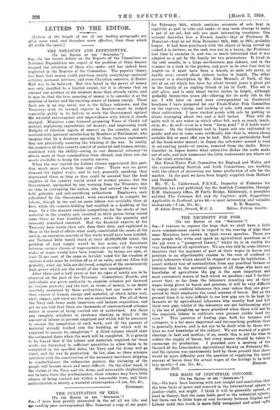LETTERS TO THE EDITOR.
[Letters of the length of one of our leading paragraphs are often more read, and therefore mare effective, than those which Jill treble the space.]
THE TREASURY AND EXPENDITURE.
[To THE EDITOR OF THE " SPECTATOR."] SIR,—In the recent debate on the Reports of the Committee on National Expenditure one aspect of the problem of State finance escaped the attention of those who spoke, and has indeed been neglected in the Reports of the Committee. The popular theory has been that money could purchase nearly everything—material articles; personal services; and even Christian converts, if Exeter Hall was to be believed. But this belief in the power of money was only justified to a limited extent, for it is obvious that no amount can produce at the moment more than already exists, and it may be that the true meaning of money is to consider it as the medium of barter and the exciting source of human energy. These facts are in no way novel, nor is the fallacy unknown, and the Treasury—with its trained experts in finance—must be judged especially guilty in its failure to warn the Government against the wasteful extravagance and improvidence with which it stands charged. Ministers come forward proposing Votes of Credit (of money), explaining expenditure (of money), and impressing fresh Budgets of taxation (again of money) on the country, and are mceived with ignorant satisfaction by Members of Parliament, who imagine that by a decorous agreeing to these various statements they are practically assuring the winning of the war. In reality the resources of this country consist of material and human energy, combined with the ability—owing to our financial solvency—to obtain more of these commodities from abroad, and these are the assets available to bring the country success.
When the war started the Labour classes appreciated this posi- tion much more clearly than any other. There was no great demand for higher wages, and in fact, generally speaking, they deprecated these so long as they could be assured that the food supplies of the country would stand at normal prices; but the Government, unchecked by any warning from the Treasury, lost no time in corrupting the nation, who had entered the war with both patriotic and self-sacrificing enthusiasm Employers, each subsidized by the Government, were encouraged to compete for labour, though in the end no more labour was available than at first, while the counter-bidding had resulted in a doubling of the wage. In a like manner similar competition for the stocks of raw material in the country only resulted in their prices being raised some three or four hundred per cent., while the quantity and necessity remained constant. Had the financial experts of the Treasury been worth their salt, done their duty, and explained to those at the head of affairs what really constituted the assets of the nation, an enormous amount of this waste would have been avoided, our National Debt would stand at least .21,000,000,000 lower, the problem of food supply would be less acute, and discontent between various classes of wage-earners on account of the varying males of wages would have been removed. As things are now, at least 75 per cent. of the sums so lavishly voted for the creation of various works must be written off as of no value, and our Allies will probably, when our bills are delivered, complain of the unnecessarily high prices which are the result of our own incompetency.
After three and a half years of war no signs of sanity are to be observed on the part of the Treasury. Committees, Boards, and individuals are given authority to examine schemes put forward en various pretexts, and the cost, in terms of money, is no doubt carefully examined by these authorities; but our assets now as then consist of human energy and material, of which latter coal, steel, copper, and wood are the main constituents. For all of these the Navy and Army make imperious and instant requisition, and yet we are told that there are thousands of constructional schemes either in course of being carried out or authorized. Are there any complete schedules in existence showing in detail (1) the amount of labour at present employed and which will be necessary to ensure the completion of each work, and (2) the amount of material already worked into the building, or which will be required to ensure its completion P A third column should show the estimated dates when the work will be completed. It is greatly to be feared that if the labour and materials required for these works are furnished in sufficient quantities to allow them to be completed on the specified dates, the Navy and the Army will go abort, and the war be protracted. So far, also, as these schemes interfere with the construction of the necessary merchant shipping to counterbalance the submarine menace, the rationing of the people will become more and more difficult. On the other hand, if the claims of the Navy and the Army and mercantile shipbuilding are to have their due predominance, these schemes may have little chance of being carried out within a reasonable time, and their authorization is merely a wasteful extravagance.—I am, Sir, &c.,
ECONOMIST.


























 Previous page
Previous page